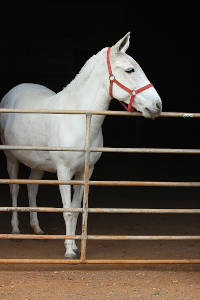Genetics
From APIDesign
(→Copying Genes vs. Species) |
(→Copying Genes vs. Species) |
||
| Line 15: | Line 15: | ||
In order to practice [[evolution]] the nature allows copying, mixing and even random errors when producing new instances of the creatures. The creatures differ slightly then, while remaining capable to deal with each other and compete to become the best survivors and produce new copies of themselves. However that only works if the ''modifications are minor''! | In order to practice [[evolution]] the nature allows copying, mixing and even random errors when producing new instances of the creatures. The creatures differ slightly then, while remaining capable to deal with each other and compete to become the best survivors and produce new copies of themselves. However that only works if the ''modifications are minor''! | ||
| - | If you triplicate human 21st chromosome you get people affected by [[wikipedia:Down_syndrome|Down syndrom]] which isn't lethal, but significantly shortens the expected lifetime and decreases/if not disables the ability to reproduce. If you mix a [[wikipedia:donkey|donkey]] with a [[wikipedia:horse|female horse]] you get a [[wikipedia:mule|mule]] - while mule is useful and | + | If you triplicate human 21st chromosome you get people affected by [[wikipedia:Down_syndrome|Down syndrom]] which isn't lethal, but significantly shortens the expected lifetime and decreases/if not disables the ability to reproduce. If you mix a [[wikipedia:donkey|donkey]] with a [[wikipedia:horse|female horse]] you get a [[wikipedia:mule|mule]] - while mule is useful and mankind even deliberately plants them, it is no good from the point of [[genetics]] - it can no longer participate in [[evolution]] and reproduce further. |
| + | |||
| + | The short term benefits may be fine, but it is a dead-end from [[evolution]] perspective. | ||
Very likely we can go even further - if you copy fifteen human chromosomes and produces a creature that can actually live - will it be able to participate in the [[evolution]] of humans? Unlikely. If it is able to evolve at all, it is going to become completely new species. The [[evolution]] will only be possible in the isolated species - mixing and sharing achievements between the original and the new species will not be possible. | Very likely we can go even further - if you copy fifteen human chromosomes and produces a creature that can actually live - will it be able to participate in the [[evolution]] of humans? Unlikely. If it is able to evolve at all, it is going to become completely new species. The [[evolution]] will only be possible in the isolated species - mixing and sharing achievements between the original and the new species will not be possible. | ||
Maybe that's [[God]]'s will? Maybe, but it clearly shows the difference between ''minor'' change and a ''major'' change when making a copy! | Maybe that's [[God]]'s will? Maybe, but it clearly shows the difference between ''minor'' change and a ''major'' change when making a copy! | ||
Revision as of 12:26, 22 June 2021
The Genetics of APIDesign is an interesting topic that recently came up when I was trying to use the Evolution vs. Intelligent design argument among my colleagues. It is a paradox of APIDesign - if you are a regular software architect you can act as an Intelligent designer and many successfully do. You have the vision and you may strive for it.
However, when you are an API designer, you'd rather worship evolution - your goal is to create a system that others use to do something intelligent, but you, as the API architect, don't set the ultimate goal. A key to success is to create a system that blossoms with evolution rather than prescribing what shall be the result.
The puzzle to gain more understanding to the difference between API and implementation is: The core concept of evolution is pretty much copy an existing thing with only minor modifications!
Copying Genes vs. Species
In order to practice evolution the nature allows copying, mixing and even random errors when producing new instances of the creatures. The creatures differ slightly then, while remaining capable to deal with each other and compete to become the best survivors and produce new copies of themselves. However that only works if the modifications are minor!
If you triplicate human 21st chromosome you get people affected by Down syndrom which isn't lethal, but significantly shortens the expected lifetime and decreases/if not disables the ability to reproduce. If you mix a donkey with a female horse you get a mule - while mule is useful and mankind even deliberately plants them, it is no good from the point of genetics - it can no longer participate in evolution and reproduce further.
The short term benefits may be fine, but it is a dead-end from evolution perspective.
Very likely we can go even further - if you copy fifteen human chromosomes and produces a creature that can actually live - will it be able to participate in the evolution of humans? Unlikely. If it is able to evolve at all, it is going to become completely new species. The evolution will only be possible in the isolated species - mixing and sharing achievements between the original and the new species will not be possible.
Maybe that's God's will? Maybe, but it clearly shows the difference between minor change and a major change when making a copy!


